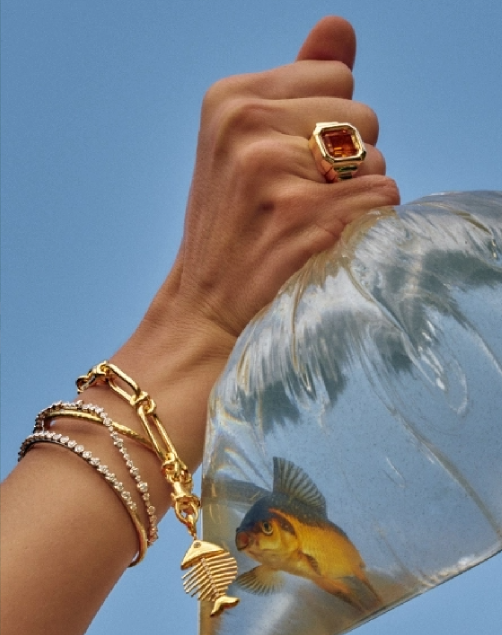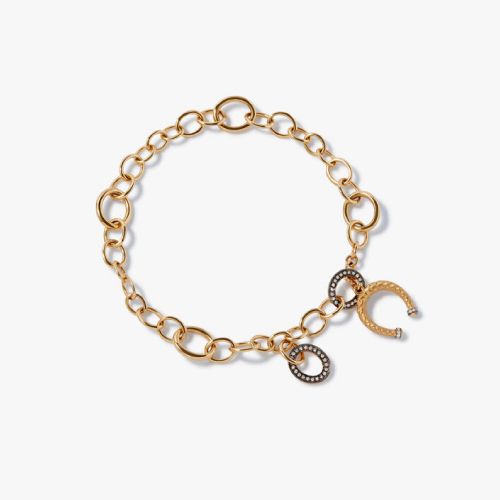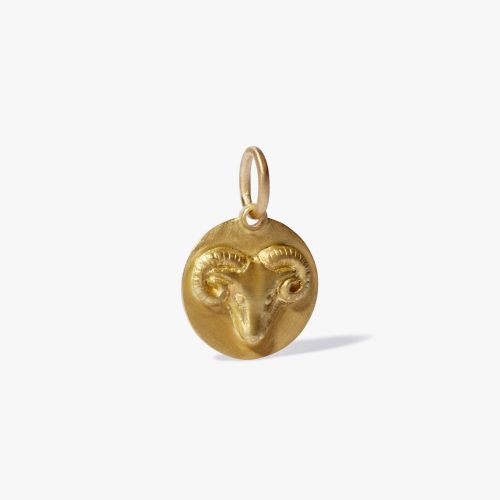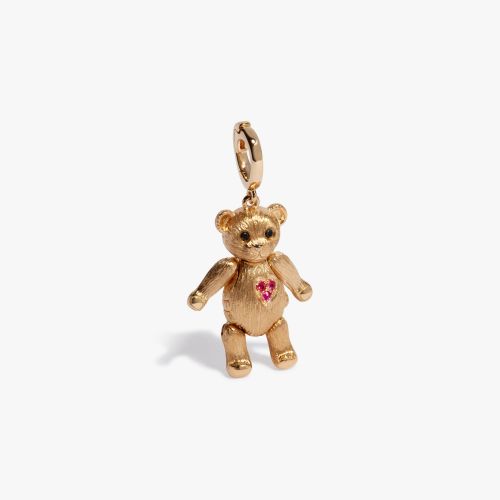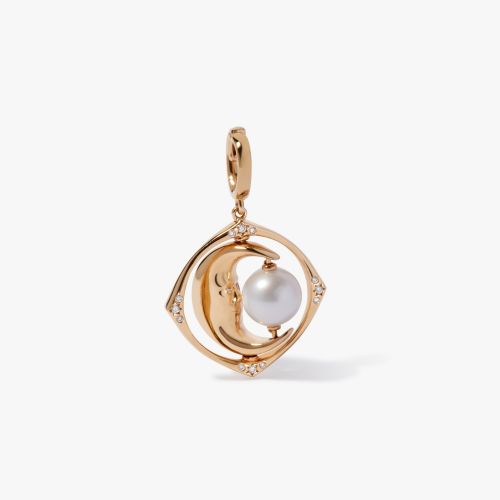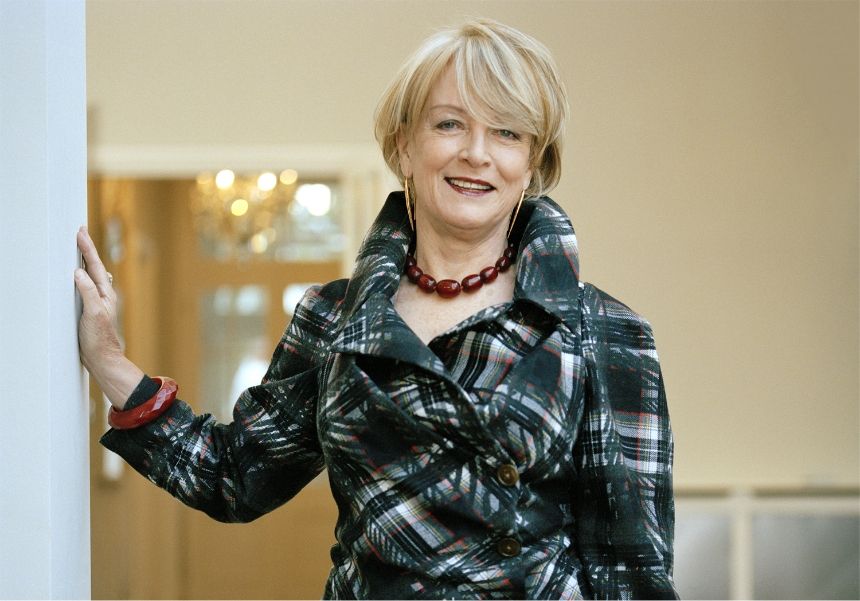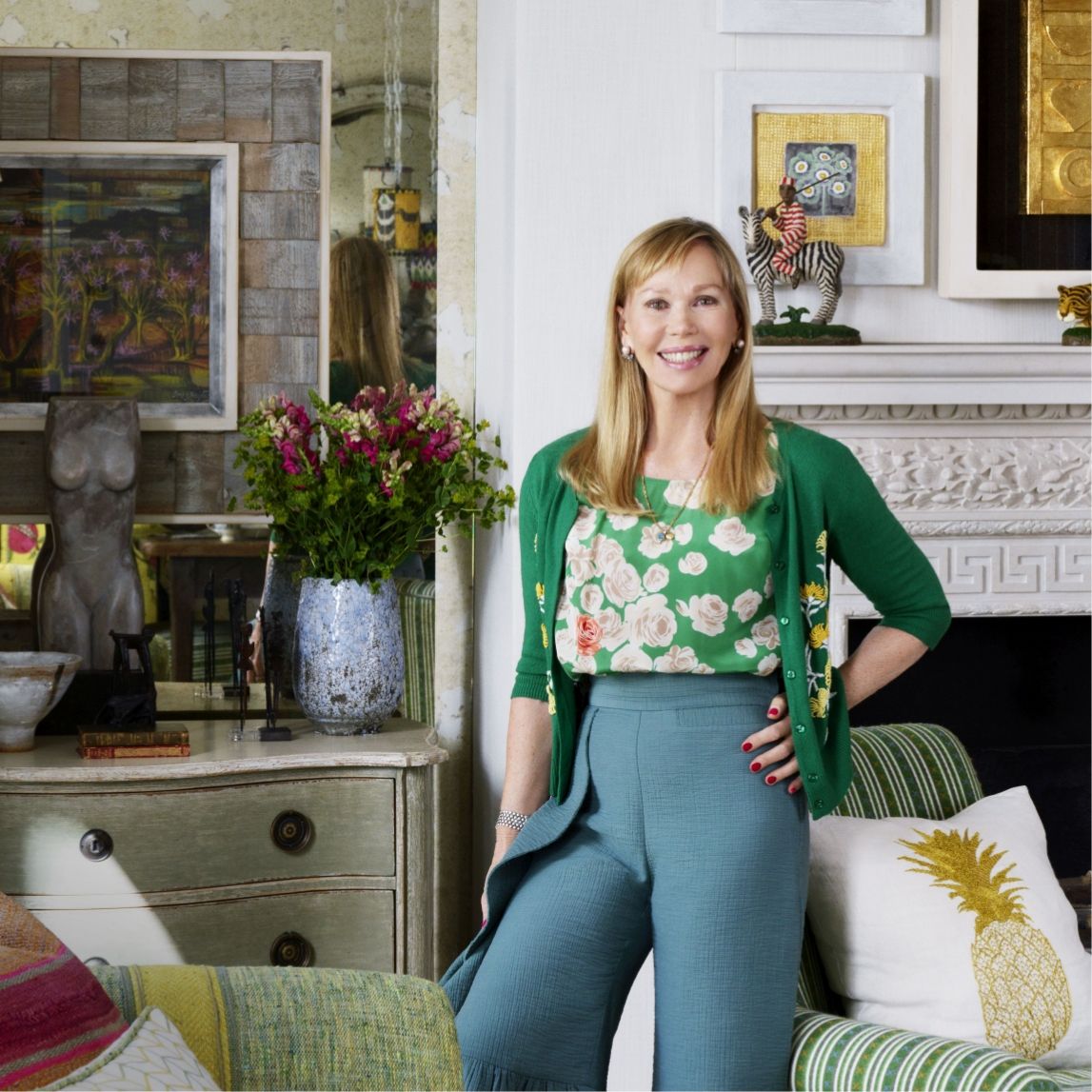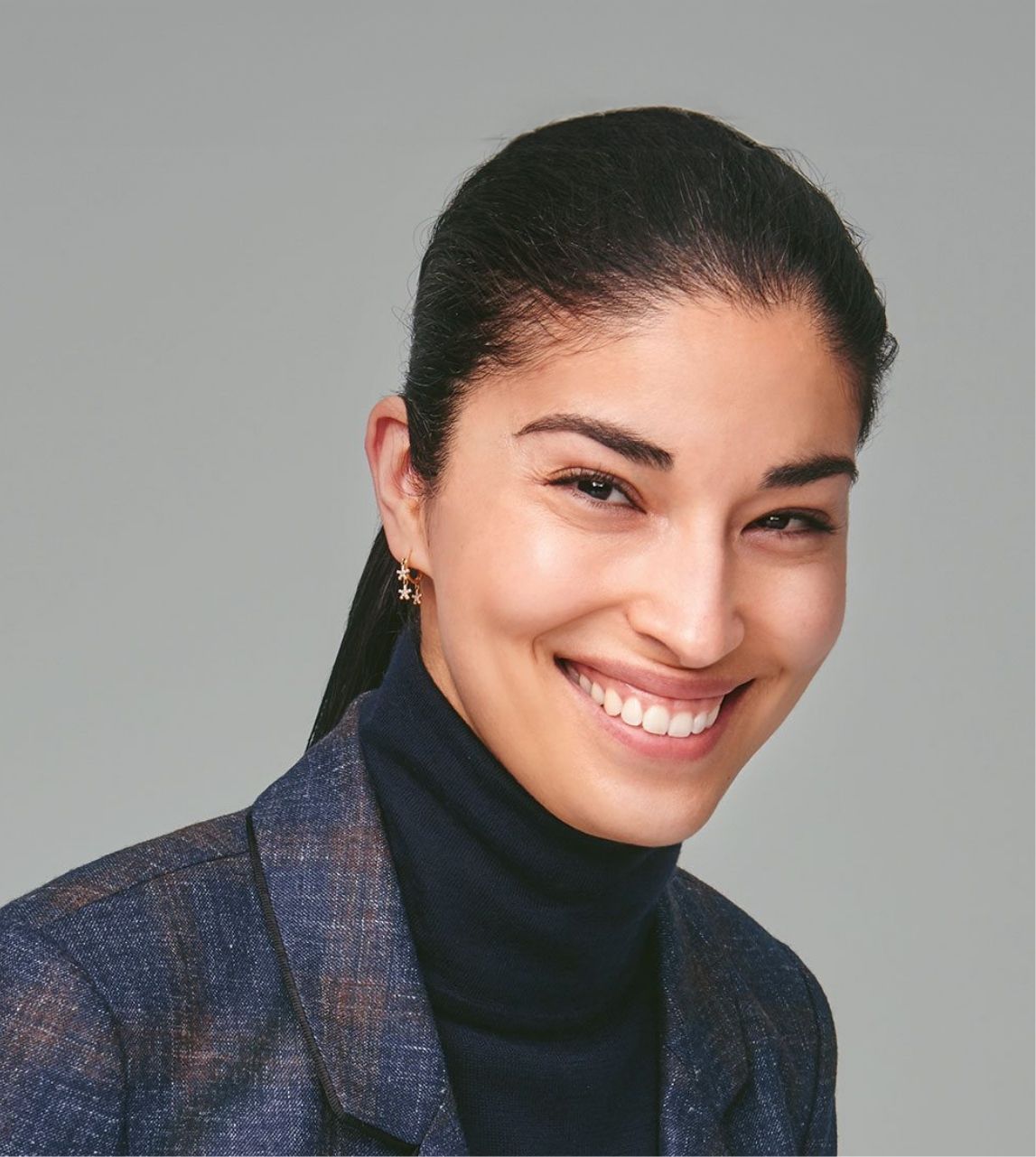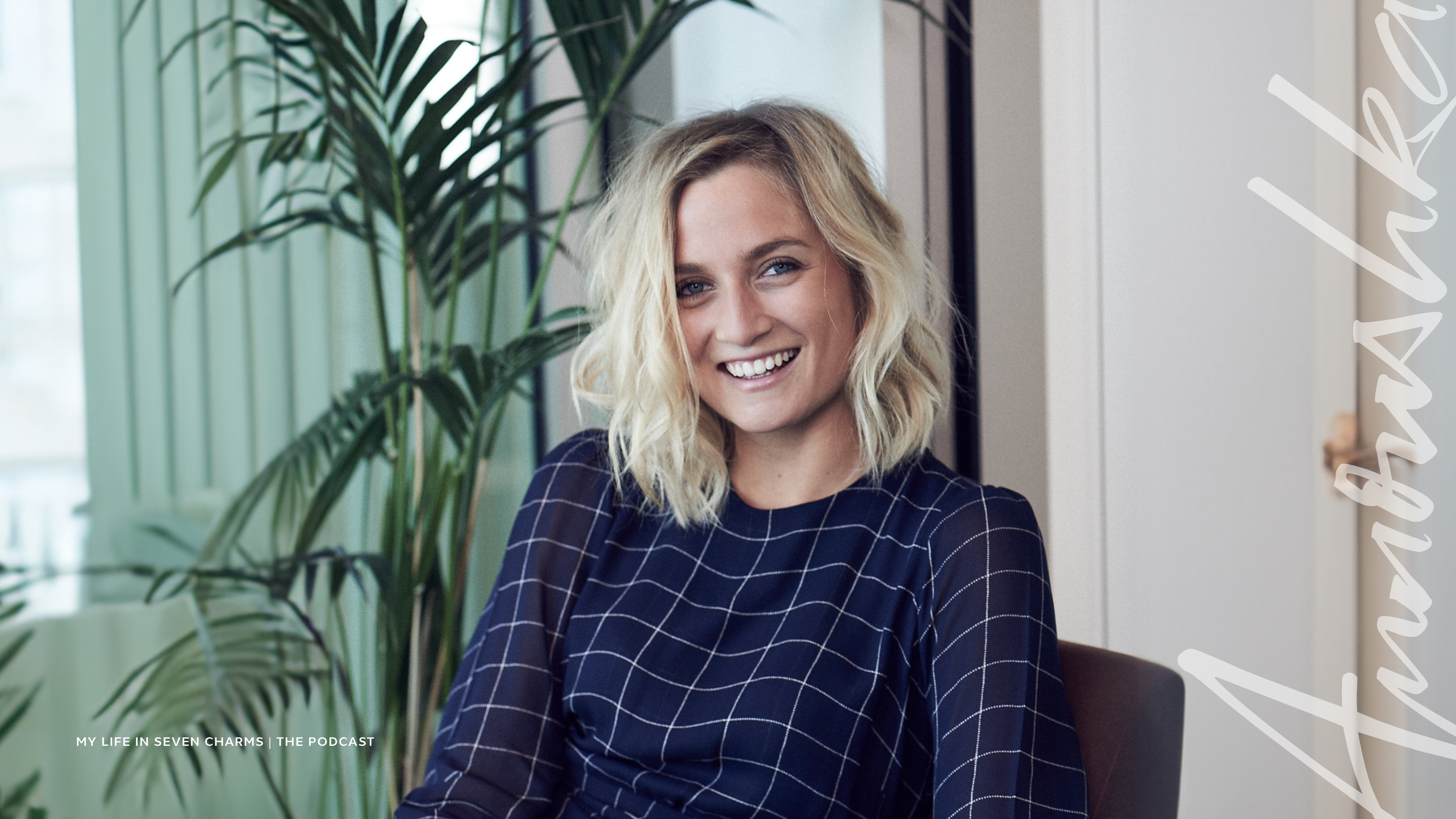
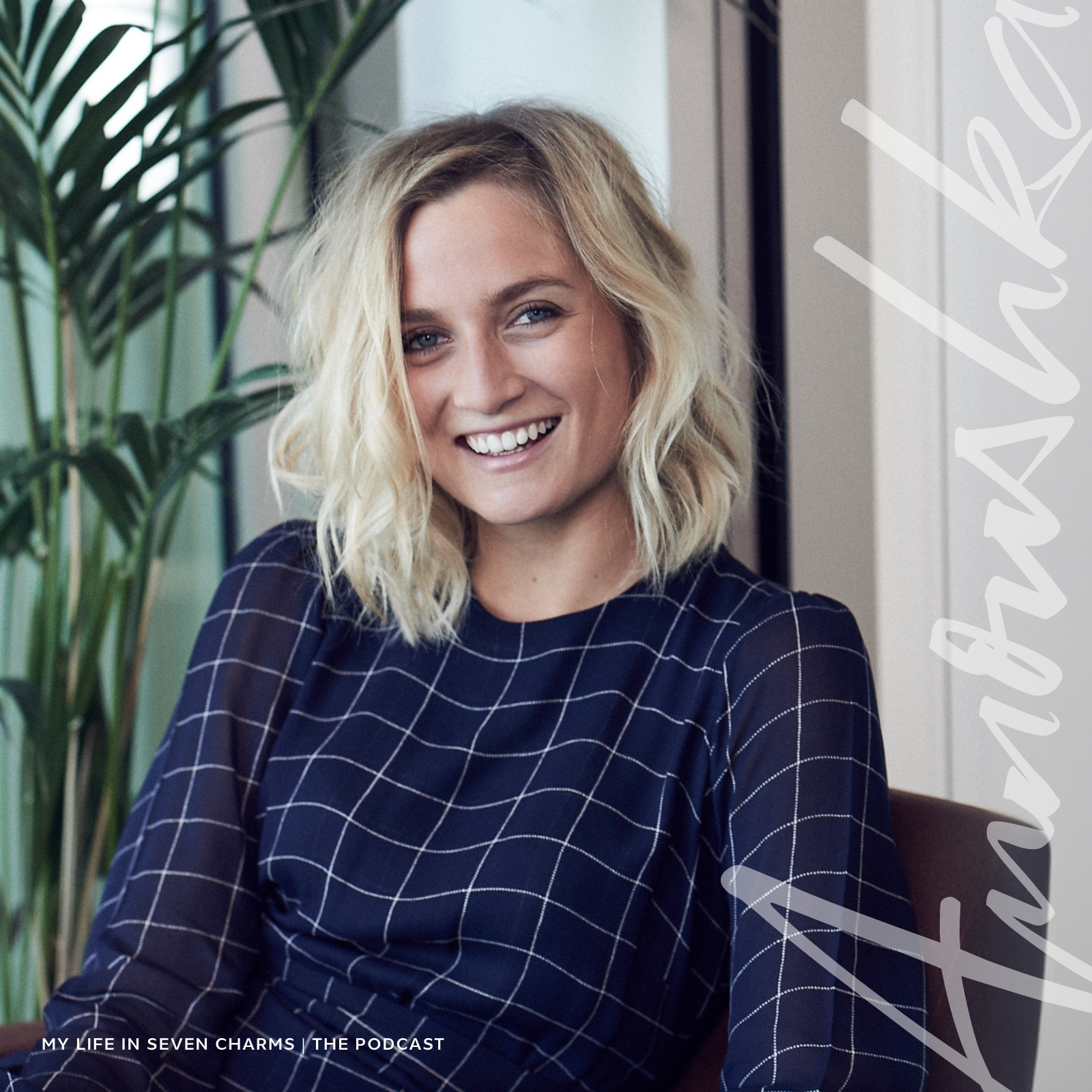
READ THE PODCAST
Annoushka Ducas:
Sophie, thank you so much for agreeing to do this podcast today. I'm really excited to talk to you, because nobody knows yet, but I think you're very soon to have a baby in six weeks time.
Sophie:
Yeah. Yeah, that's right. I've managed to keep it pretty quiet these last eight months, and no one has seen me, really, so it's not been too difficult. But, yeah, got to tell all the world at some point, so I thought as we're going to talk about my life in seven charms today, the baby is going to play a part in that somewhere, so I thought it would be nice to share it with you.
Annoushka Ducas:
Well, I feel very, very, very honored. Actually, I guess you're right, you can sit behind the desk and nobody would know the difference. I would have no idea, actually, looking at you.
Sophie:
It's just the hot flushes, yeah.
Annoushka Ducas:
I still can't tell. So, your first
is a teddy called Trudles. Very friendly teddy, very friendly face, and very loved, I think. So, lovely, slightly gold, but feels like it's been around for a very long time and nurtured and cuddled. His legs and arms will move, he is in
with a bit of texture, and I think he should have black diamond eyes and a little tiny brown diamond nose, and he's a
and his tummy opens and you can put something inside, which might mean something to you. That's the way I'd seen this cute little teddy.
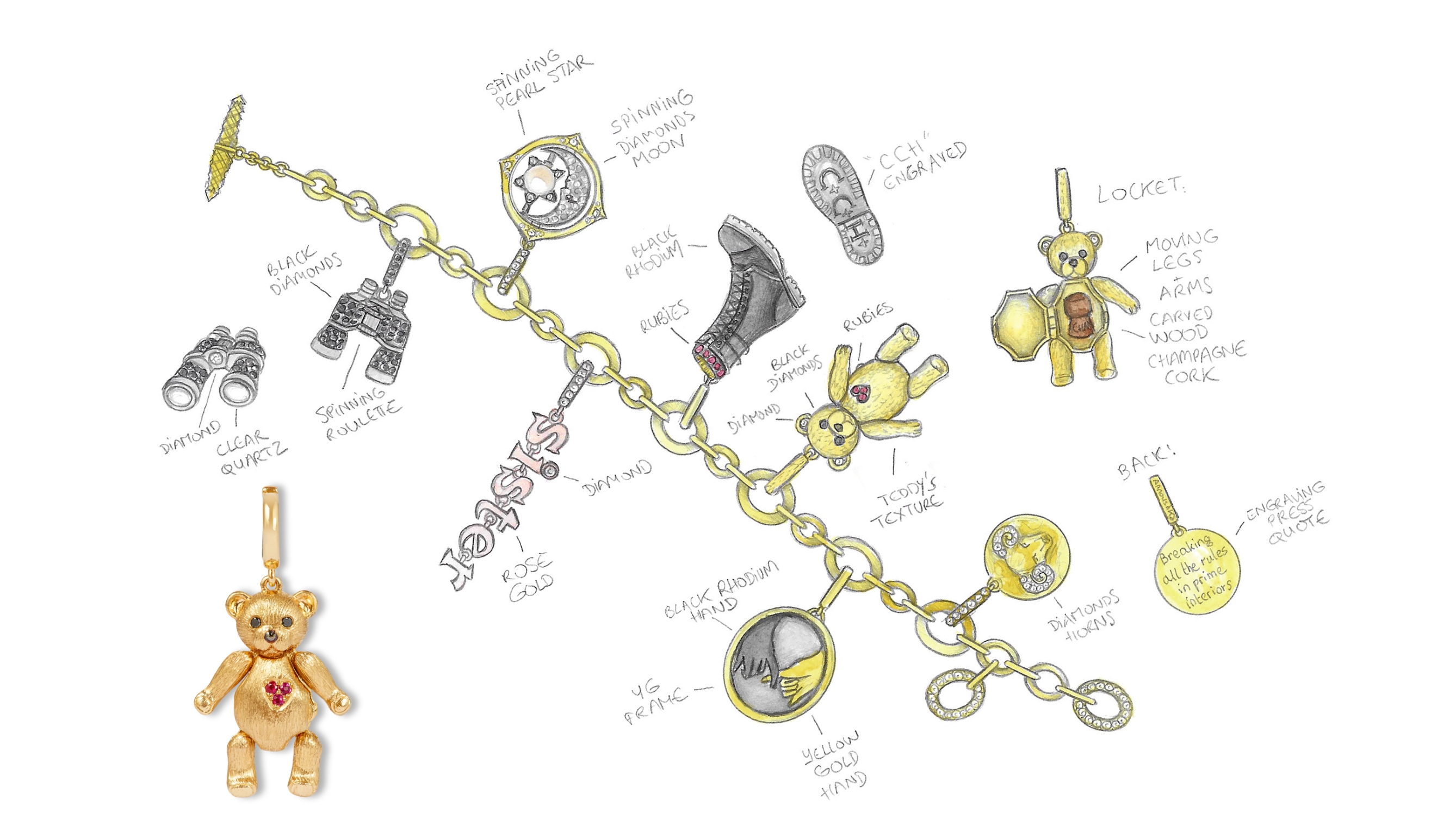
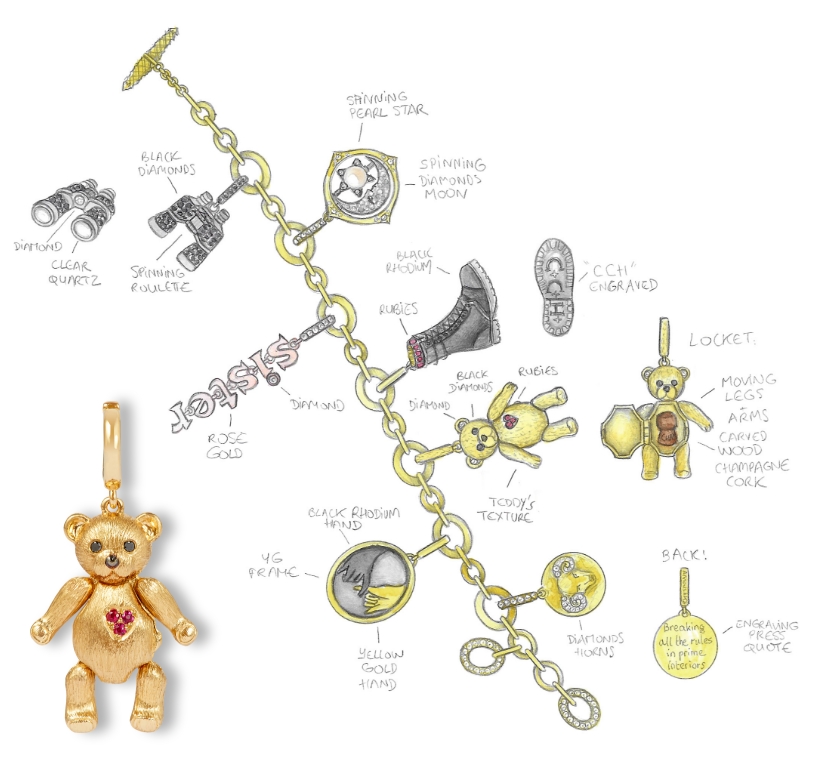
Sophie:
Sounds gorgeous.
Annoushka Ducas:
Tell us why you've chosen Trudles. A, why is he called Trudles, and B, why the teddy?
Sophie:
Trudles, I have no idea where I plucked that name from. I think at some point I must
have made it up or smushes two names together or something. But I've had the bear since I was born. My mom got it for me before I was actually born. He has a battery operated little heart that went inside him which is meant to comfort a baby, and apparently I didn't get on very well with it as a newborn, so we took that out, and it just left this pouch inside him. At some point, my uncle gave me a cork from my parent's wedding that he'd kept, and so I put that inside the pouch instead, and that's where it still lives today.
But the bear's been with my everywhere. We moved quite a bit growing up, and embarrassingly, he went off to uni with me and was probably lingering about in my adult life a little too long. Recently, I gave him to my step-daughter, and she loves the bear as well now. It's just that thing when I think of home and I think of my bedroom as a child, I think of Trudles. So, yeah, very special, squashed, ancient looking bear, basically, that has been a big part of my childhood.
Annoushka Ducas:
You said you moved a lot. How many times did you move when you were growing up?
Sophie:
My parents hate me referring to the number because I think they get embarrassed, but it was about 14 times until I moved out and lived on my own and became an adult. But I was born in London and we lived in Putney and Wimbledon and places like that, and then we moved to South Africa when I was eight. My mom is South African, and she got this brilliant job becoming the manager of a wine farm. It was just really formative for my sister and I. It was this adventure, and we had all this space and living in nature, and all the going on safari and stuff. It was just a dream, really. So, yeah, we were there for about three, four years, and then we came back and moved to Devon, and then my parents moved to Portugal when I was about 19, 20. So, we've lived in lots of places, and within those destinations, lots of different homes as well.
Annoushka Ducas:
I mean, they were obviously serial movers, but I just wondered whether they were moving because your mom liked doing up houses as well. Is that something that influenced the move, do you think?
Sophie:
I think it was part of it. Certainly in the early days in the eighties and nineties, they were doing a little bit of doing up houses and selling them in those glory days when you could do that and make a good profit, I think. But, no, I think she in particular just sort of has itchy feet a bit. I have a slight fear that I might have picked up the same affliction, because I've already moved quite a lot as an adult, so I'm looking forward to settling down and creating a family home and staying put.
Annoushka Ducas:
Just out of interest, this Trudles came with you everywhere, but in all of these moves, was there something that absolutely meant home to you? Because I guess when you move that often, what signifies home?
Sophie:
Yeah, that's a good question. I think there are a few things, a few belongings that my parents have, which is definitely part of the reason I became interested in being an interior designer. They've got this one big painting of Cape Town, actually, and every time that came out of a box and was hung up, it just felt like home, and the familiarity of seeing these possessions in different places and spaces. So, I think that's where my fascination with home and how important those things are started.
Annoushka Ducas:
Yeah. I guess undoing and making up your bedroom again, were you able to decide where the furniture was going to go? Because I know you've studied spacial design, didn't you? So, I just wonder whether it started very early on in your life.
Sophie:
I think it definitely did. My parents were very relaxed about that, I think. I have memories of my dad helping me up cycle and paint pieces of furniture, and realized some of my probably really dodgy kind of shabby chic inspired ideas at the time, and that definitely had a part to play in where I am now, I think.
Annoushka Ducas:
I mean, your second
is a pair of binoculars. I love the idea of a pair of binoculars, because I think we could make them so beautiful in probably
with black pavé diamonds, so tiny little
with black [inaudible], so you'd never see the claws that hold the stones in place, turning and moving exactly as a pair of binoculars would, with just crystal instead of the lens, and just completely three dimensional. But tell me why... I mean, I'm kind of guessing why you've chosen binoculars, but I'd love to know, why binoculars?
Sophie:
Those formative years when I was between the age of eight and 12 and we lived in South Africa made such a big impact on me, and when I began working for myself and for the first time had some sort of financial independence and freedom and was able to do things that I really wanted to do age kind of 25, I started going back to South Africa every year. I've got a childhood best friend from school who I'm still very close with, and together we would have these wonderful weeks in Cape Town where I just felt so inspired by the landscape and lifestyle and nature and the people, and then we would always try and tail off the trip with a bit of time in the bush.
It's just my happy place. It feeds my soul. There's nothing better for me than the pretty basic holiday in the bush, camping and rattling around in the back of a Land Cruiser looking for animals and not thinking about too much for hours on end, or actually, rather, thinking about a lot for hours on end while you scour the bush looking for something. I don't actually mind at this point if I see an animal or not. I just love the time spent there and the days that you have, and the early starts and the sunrises and the sunsets and everything about it. It's just as good as it gets for me.
Annoushka Ducas:
Do you think that your work is very inspired by Africa?
Sophie:
It is. It's subtle, I think. It comes through the colors and the materials and the love of natural materials and not interfering with things too much, bu then I'm also a passionate art collector of contemporary African art, and that therefore comes through. It is rather a constant thread. Sometimes it's harder to spot than others, but it's certainly always in the back of my head.
Annoushka Ducas:
Yes, I imagine it could just be just a tiny hint of something. Actually, I've found that having spent some time in myself, I've got a collection that's not obviously Africa, but it's definitely come from there in terms of textures and things.
Sophie:
Yeah.
Annoushka Ducas:
Just thinking about the binoculars, I mean, I guess a lot of what you do is look through very, very closely at a lens at how people live and how people go about their lives. But my question was how do you start? When a client comes to you, and you've never met this client before, but they've come to you and they want you to do the project, what's the starting point? Is it a thing? Can you just talk me through your process a bit?
Sophie:
Yeah, it's a few different things. I mean, to begin with, it's a lot of listening and just trying to establish that relationship. Assuming you've got past the first date and I've got a good feeling and they've got a good feeling, it's really about, yeah, just listening and trying to really understand how somebody likes to live. We've got a survey that we use as a grounding to ask and quiz our clients with pretty intimate, personal questions. Who wakes up first and are they showering and are they going to disturb you if they're showering?
Annoushka Ducas:
Oh, really, really intimate.
Sophie:
Really intimate. Where would you like to have your morning cup of coffee, and are you watching the news or are you listening to the radio? Because once we know all of that, we can really design the perfect home around someone. I just am such a strong believer that a really wonderful, well designed, well thought out, beautiful home can enhance your life.
Annoushka Ducas:
It's interesting when you say that you give them a questionnaire, because if you gave me a questionnaire and said, "Where do you have your cup of tea?" I'd be thinking, "Well, maybe, Sophie, you can suggest where I might have my cup of tea." Do you know what I mean? Because it's force of habit, that. But in a way, as you say, if you can make a room better and relaxing, actually, I guess it can go the other way. It can change your client's habits to something better. Does that make sense?
Sophie:
Totally. Sometimes, it's just about realizing someone's dream. One of our clients wanted to be able to make a cup of tea without moving her feet. I think she drinks a lot of tea. So, we needed to make sure that we could reach the cup, the teabag, the kettle, the teaspoon and the milk and the big all in one spot. Those sorts of challenges, she felt mad for suggesting it at the time, but it just is like, "Well, God, that makes so much sense." I mean, how many cups of tea do we all drink a day, and wouldn't that just make life so much easier? So, yeah, there are these little conversations that come out of thinking about it all.
Annoushka Ducas:
If somebody says to you, "Where is home for you?" Would it be South Africa? Not now, but in terms of growing up, would it have been that?
Sophie:
Yeah, I never know how to answer that question. I think it would be, I feel British. I feel British with a bit of something else going on, a bit of confusion. But, yeah, no, now London is home, and it's where my husband is and where my family is, my new family, I suppose, my family that me and my husband are creating.
Annoushka Ducas:
Soon growing family.
Sophie:
Yeah.
Annoushka Ducas:
Growing family. But you said that you feel you love the countryside, et cetera. Do you think that's something that will change now you're about to have a baby and you obviously love the countryside?
Sophie:
Yeah. I think it will change. We're having a lot of conversations at the moment, especially spurred on my year of lockdown being trapped in our house in London, albeit a lovely house, I have been dreaming of trees and green spaces. Yeah, I think I'll be a happy girl if we can find a way to spend a bit more time in the countryside, and to raise our children there as well. It was so spoiling and special for me growing up, I just can't really imagine not giving that to my kids.
Annoushka Ducas:
So, Sophie, your third
is a
sign of Aries. Actually, you're particularly lucky, I think, because the birthstone for this month is
and everybody would love to have diamonds as their birthstone.
Sophie:
Yes. Convenient, that.
Annoushka Ducas:
I always want that. Very convenient. I had visualized it as the Aries sign, the ram, and I'd like to make his horns out of diamonds. I see it as a coin, like a two dimensional coin. The ram's head will come out of the coin, because slightly raised so that when you rub your hand over it, it'll be raised, a bit like an old Roman coin. Do you think you're a typical Aries? I mean, I think Aries are motivated, confident, fiery.
Sophie:
Yes.
Annoushka Ducas:
Do you recognize?
Sophie:
They are. I don't know, I don't go in for horoscopes that much, but I remember being a kid and realizing that I was an Aries and reading my horoscope and all the characteristics of being an Aries and quite liking what I was reading. So, I think it's one of those mind body things that I've kind of channeled being an Aries. Somehow, it just feels like me and my journey of growing up somehow and realizing who I am. I think, really, the making of me was starting my business, and that springboard just changed my life, really, in so many ways, and it sort of changed how I feel about myself and who I am. It's all just-
Annoushka Ducas:
Tell me more about that. What do you mean by that? Because you started your business when you were 24, is that right?
Sophie:
25.
Annoushka Ducas:
25. Yeah, look, that's pretty young, actually, I have to say.
Sophie:
Yeah. I was totally clueless. I had no idea what I was doing. It was entirely driven by naivety, really, of what I was getting myself into, and just a bit of hope and wishing on a prayer kind of thing.
Annoushka Ducas:
Had you always known? Did you always think, "I'm going to run my own show"?
Sophie:
I think I probably thought that. It wasn't so black and white. I knew that I was strong-minded in how I thought things should be done and how I wanted to do things. I had this great job working for this company called Spring & Mercer, and I had lots of responsibility and autonomy. They were very respectful of me and my opinion, and it felt like we were doing it together. But I felt frustration that I was doing it exactly how I wanted to do it, and an opportunity presented itself for me to basically take on a project on my own, and my bosses didn't want to do it. It wasn't quite the right project and budget for us, which I was furious about. But with hindsight now, I realize that's a totally reasonable reaction.
Annoushka Ducas:
What, now you run your own studio?
Sophie:
Yeah, yeah. So, I had a conversation with this guy who has since become one of my very best friends. He just said, "Well, if you go out on your own, you could do this, and I'll give it to you as your first project." That's what I did, because I just sort of had nothing to lose. I wasn't in a relationship, I didn't own any property, I didn't have a mortgage. All I had was a bit of student debt and staying with a friend in their spare room, so I just thought, "Why the hell not?" And turned out to be the right decision. That project quickly swirled to two or three more within the next month or so. The rest is history, really. But it was just the making of me. You know?
I've learnt so much about so many things, and being a businesswoman, wearing all the different hats that you have to wear, which you know all too well, I am sure, it's fascinating and it's fun and it's scary and it's lonely sometimes as well, but I've enjoyed so much learning about lots of different things, and not actually just feeling like all I am is an interior designer or a designer. I feel like that's part of what I am. I even tentatively use the word entrepreneur sometimes now, which feels a bit scary.
Annoushka Ducas:
Yeah, scary. I took on a business when I was 24 as well, but do you think there's something about being young that it's not scary because you don't really even think about what the consequences might be?
Sophie:
Yeah.
Annoushka Ducas:
Do you think there's something about that that you're just like, "Get on with it"?
Sophie:
Totally, totally. I'm sure that was 95% of it. If I was doing it now, oh my god, all the things to consider and the responsibilities of life, I'm sure I'd never do it now.
Annoushka Ducas:
No. What's been the most difficult? Because as you say, you've learnt it all on the job, if you like. But what's been the most difficult part of running your business?
Sophie:
It's almost the same thing that I love about it is the thing that is sometimes extremely difficult about it. What we are is basically a service. With Studio Ashby, we don't sell a product, we sell a service, and so it's all about people and those relationships. The best thing about it is those relationships and the people I've met, but at the same time, it can be the people that make it really difficult. I think when you're dealing with the extraordinary clientele that we're dealing with, occasionally you just come against a tricky scenario, yeah.
Annoushka Ducas:
Sure.
Sophie:
A bit of a shocker.
Annoushka Ducas:
Yeah.
Sophie:
It's only happened maybe three or four times in the last seven or eight years, which I suppose is pretty good going, but it always just takes me by total surprise, and I'm just like a little baby, can't believe that someone would be so horrible kind of thing, or something along those lines. Yeah, I do find that a bit difficult sometimes.
Annoushka Ducas:
Presumably now you have grown, you can delegate, because I've always found that delegation when I was certainly younger was one of the hardest things, because it's always easier to do it yourself.
Sophie:
Yeah. Oh, no, do you know, I'm very good at delegating.
Annoushka Ducas:
Are you?
Sophie:
I think I'm fundamentally quite lazy deep down inside, and so I've found a way of delegating pretty well. I also have an amazing second-in-command, Fiona, whose brain is like the other half of mine, so all the things that I can't do, she can do, and so together we figure a lot of it out. But, no, delegating is totally key, I agree.
Annoushka Ducas:
Your next
is a rose. I was really interested when you told me you wanted to have a rose, but you said, "But I really don't want an actual rose, because I think it's going to be really horrible."
Sophie:
Yeah.
Annoushka Ducas:
I actually think we could make a really beautiful rose, but I haven't done that. I think you wanted rose because your sister's called Rose.
Sophie:
Yeah.
IAnnoushka Ducas:
So, I've just written the word sister in individual letters made of
with a little diamond over the I. It's linked by individual just little, little jump rings, so it'll move, because I really don't like charms that are stiff and don't move with you. But if you were ever going to have a rose, I promise you I could make you a gorgeous rose. Tell me about Rose.
Sophie:
Yeah. Rose is my younger sister. She's two years younger than me. She's just my very best friend. We fought like cats and dogs growing up. She was so irritating. She stole all my clothes and she ruined my fun with my friends, and she embarrassed me. As teenagers, we quabbled. Then my parents moved to Portugal when, yeah, I was about 19, 20, so Rose would have been about 18, and I think we both realized that we should probably hang onto each other and review our relationship, because we were going to need each other. Ever since, we've just been bestest pals.
She is so different to me. She's so free spirited and light, and I've always felt that I'm, as the older sister, more serious and mature and got lots of responsibility. I had lots of fun in my twenties, but nothing like what she got up to. She just knows how to have a good time, and she doesn't stress and worry and overthink, and she's not all in her head like I am. I just look at her and her life and it just seems so joyful and full of sunshine that I find spending time with her just the best.
Annoushka Ducas:
She's a life enhancer.
Sophie:
She's a life enhancer. Exactly. Yeah. I just adore her. She's also so talented. She's a chef, and she's the head chef at Spring, this gorgeous restaurant in Somerset House owned by Skye Gyngell. I think the two of us, without really thinking about it, have become sort of like if we were together, the perfect little homemaker. I can't cook and she's not great at design, but if we were to combine ourselves.
Annoushka Ducas:
It's so interesting with your background, isn't it? Because food is so much about home, isn't it?
Sophie:
Yeah. The sort of food that she cooks and she cooks with Skye is that wonderfully comforting, delicious, uncomplicated food as well. It's not all frilly and fancy. So, yes, she's just a big part of my life. When I wanted to set up this new company last year, I was trying to figure out what to call it. Essentially, it's the sister company to Studio Ashby, and it's product, so it's just shopable version of our interior worlds that we create, essentially. It's really fun, and it was kind of to satisfy a creative itch that needed scratching, which sounds so crazy because what I do is creative, but sometimes, whilst I am being creative, it feels like it's within the conditions of a pressure cooker kind of thing. It made me think a lot about Rose, because I just thought, "I'm sort of trying to create another business so that I can be a bit more like Rose and have a bit more fun and feel a bit more free." So, I called it Sister. I called this new business Sister.
Annoushka Ducas:
I love that. Was she thrilled by that?
Sophie:
Oh, yes. She tells everyone she's my muse, which is quite right. But also it's an ode to all of the strong women in my life. I have an older sister called Harriet, who's training to be a midwife, all my wonderful girlfriends, and my mom, and all of these strong, amazing, feminine characters in my life. I just wanted it to be able that and to celebrate femininity and female strength and relationships, and so Sister is kind of all about that, basically.
Annoushka Ducas:
Quite a lot of it is repurposing, is that right?
Sophie:
Yeah.
Annoushka Ducas:
You're probably not going to tell us, but are there particular places that you go, to particular car boot sales? I mean, I love a car boot sale.
Sophie:
I love a car boot sale. Yeah, there are. I mean, there are the ones that everyone knows about, like Kempton and Ardingly in England, which are great, but we go all over the place as well in Europe and stuff, so, yeah, it's just whatever we can lay our hands on. I just was determined not to just produce a whole load of product just for the sake of it, because a big part of it as well is with what I do, sometimes you come across some quite gruesome waste, in that someone might buy a £10 million apartment and it's perfectly great, but they don't like the bathroom and kitchen and flooring, and it all comes out, and it does sort of keep me up at night a bit, that-
Annoushka Ducas:
Goes in the skip.
Sophie:
Yeah, that waste. I think especially with my South African background, it really hurts. My mom is someone who keeps every teabag and cork and finds a new second use for it, so I've got a bit of that in me. My dad will eat a piece of cheese that's been sitting in the fridge for three months. So, yeah, the waste of life really bothers me. We're trying very hard with Sister. It's really a challenge, but we're trying very hard to not add to that problem, and so we're giving things a second lease of life, or when we do make something to order, it's an heirloom kind of forever piece of that level of quality that means that it should never really have to go in the bin. Yeah, that's kind of part of the motivation as well.
Annoushka Ducas:
This is probably a really annoying question, but if you were to describe your style, either for Sister or Studio Ashby, how would you describe it?
Sophie:
I would say it's eclectic. There's always a mix of old and new. It's colorful. I have this sort of philosophy, which is start with the art, which is something that I saw to myself when we always start a new project, because whether that comes from a client's own artwork or we're sourcing a new artwork that is the anchor and starting point for that room, for me, the art is the piece or the thing in a space that has the biggest potential to change your mood and impact you and adjust the feeling of that room. Art plays a really big part in what we do. Yeah, I just like things to feel layered and rich, but then also for there to be a freshness and a simplicity to the space. I hate clutter, but I love stuff, so it's just trying to play with that balance.
Annoushka Ducas:
Now, Charlie's boots. Now, Charlie is your husband. Anyway, I loved your description, actually. I thought, "Gosh, I'm not sure I can better it," because you said, well, first of all, you said that they're leather military boots, and they've got 18 holes, and he obviously wears them with red socks. You said, "I'd like it to be carved ebony for the boots, and have rubies at the top to represent the socks." But I think it's really important that the bottom of the boot is very much as close to the tread of whatever is on the bottom of these military boots. You said you'd like to have his initials on it. So, you can see on the bottom of the sole, we've put C.C.H. That's the way I would see it, just completely as perfect a military boot as we can get.
Sophie:
Sounds awesome.
Annoushka Ducas:
How did you meet?
Sophie:
We met on a blind date, actually. A friend set us up on the simple premise that we were both tall and both creative. He thought we'd be a good match.
Annoushka Ducas:
Oh, quite random.
Sophie:
It's so random.
Annoushka Ducas:
That is quite random.
Sophie:
I mean, he asked me what I was looking for, and I just said, "Someone tall." It was really my only requirement. I don't know why I was so fixated on that at the time, but he did produce someone that's nearly 6'7.
Annoushka Ducas:
Oh my god. How tall are you?
Sophie:
I'm 5'10.
Annoushka Ducas:
Okay.
Sophie:
Yeah. We met on this first date, and it's a cheesy love story, I'm afraid. I knew within literally five minutes that he was the most perfect person for me ever.
Annoushka Ducas:
Oh my god.
Sophie:
I think he thought the same. Yeah. We just went full pelt from there and haven't looked back. I met him the same year I set up my business, so perhaps that's why I feel I've changed so much or grown up so much since that special year. But he's just the loveliest, sweetest, kindest man, which makes him sound a bit wet, but he isn't. He's strong and principled and intelligent and sensitive. His family are extraordinary. He comes from this long, huge sporting legacy of overachieving, fascinating, brilliant people, not least his own parents and his father, Joe Casey Hayford, who very sadly passed away a couple of years ago. But he's a fashion designer and a tailor, and he has a company called Casey Hayford, which has got a little shop on Chilton Street, which is actually where I'm currently sitting recording this podcast, because it's nice and quiet in lockdown. Yeah, he's just everything, really.
Annoushka Ducas:
But you come from very different backgrounds, is that right?
Sophie:
We are very, very different, but somehow it just works. He's very kind and patient and easy. He's just super easy. He reminds me a lot of my dad, who is the loveliest man as well, and has coped very well having a strong wife in the form of my mother, and two crazy girls with Rose and I. So, yeah, I just feel like I've hit the jackpot, really, with Charlie. Yeah, he had to be represented in the charm somewhere.
Annoushka Ducas:
Oh, good. Well, it's a lovely charm. Both coming from a real design background, what happens at home? Are you fully in control of the way your house looks? I mean, I'm sure everyone wants to know what is your baby's bedroom going to look like. Is it a discussion, or is it just, because you must be so sure about what you like.
Sophie:
I'd like to say it is a discussion. There are things that we discuss, and those are artworks usually. What we're deciding to buy together art wise, I definitely discuss with him. But on the whole, I have to admit, he probably doesn't get much of a look in. I can't really contemplate a universe where he would put his foot down and tell me I can't do something. I think I'd have the world's biggest tantrum. So, he probably knows better and just steps out the way. I think he's very lucky, because then he just gets to sit back and enjoy it and live there. He loves my style, or so at least he promises me, and so I think for him it's an easy win. He's definitely got an opinion and is a real aesthete and knows his stuff, and occasionally he'll be like, "I don't get that. That's not very nice," and I'll probably just ignore him.
Annoushka Ducas:
Or we'll say, "Don't worry, he'll come around to it."
Sophie:
Yeah.
Annoushka Ducas:
Just back to that question, because I'm sure everyone wants to know what your baby's bedroom might look like.
Sophie:
God, that's a good question. I haven't figured it out.
Annoushka Ducas:
[crosstalk].
Sophie:
Well, we don't know what we're having, so that makes it all a little bit more difficult.
Annoushka Ducas:
I can't imagine it was either going to be pink or blue.
Sophie:
No. I'm a bit worried it doesn't feel very kiddy, which I think I was always going to do. I have found it truly difficult, actually, because I think everything on the market for kids and baby's bedrooms is so in this Nordic Scandi style, which I really don't like, and I'm hunting and searching for stuff, and I can't really find what I'm looking for. But I tried to just make it very calm and peaceful, and then there's lots of color coming through with the art, and I've got some Svensten fabrics, which is this brilliant Swedish fabric house, which does really joyful, fun, loud prints and stuff. It'll be a higgledy piggledy mix match of stuff. Hopefully it'll all come together in the end.
Annoushka Ducas:
Your sixth
is the moon in the stars, you said. It's a three dimensional crescent moon, and then sitting in the crescent of the moon is a star which is made of a
with little diamonds around it. Both the moon and the star spin independently. Very difficult to describe this, but you're going to have to [crosstalk].
Sophie:
I'm with you. It sounds wonderful.
Annoushka Ducas:
But other than there's something so beautiful and romantic about the moon and the stars, why have you chosen moon and the stars?
Sophie:
I guess I'm looking to the next part of my life, which is becoming a mom. I'm already a semi mom because I'm a step mom to my step daughter, Rainbow, who's Charlie's seven-year-old daughter, who I adore and is just the cutest little cherub ever, and just like her dad.
Annoushka Ducas:
Is she excited?
Sophie:
She is so excited, yeah. So excited. I think she'll be really disappointed if it's anything other than a baby sister, but we'll have to cross that bridge. Yeah. I've always wanted to be a mom. I've always loved babies. I've been broody forever, and I, at least since I met Charlie, have wanted to just have babies, but we had to kind of get to a point where I could do that with work and to be there and for it to be happening, and we're at the end now, I just feel... well, we're at the beginning, but I'm just so excited. My mom has been the most extraordinary mom to me, and I just hope that I can do the same. I know that Charlie will be a wonderful dad because he's already doing it.
So, yeah, the moon and the stars is what I think of my own little family in the form of Charlie and baby and Rainbow and future sproglets, and I'm just very excited about that, and I'm sure our whole life is about to change, but for all the right reasons. I'd like to have lots of babies, but we probably won't. I'd like to have a huge family.
Annoushka Ducas:
Careful what you wish for.
Sophie:
I know.
Annoushka Ducas:
I've got four. It is absolutely wonderful. How do you think your own childhood will inform how you bring up your baby? What do you think you will take from your own childhood?
Sophie:
Gosh, so much. I mean, I was so lucky and so privileged, and I have the most wonderful parents. I hope I can replicate it in many ways. I think the adventure, absolutely, and the getting to know different cultures, I hope that somehow Africa is able to be a part of our children's lives. I mean, Charlie's ancestors are from Ghana, but he's only ever been there once, I think, when he was a child, and so we really want to go to Ghana and spend some time there and make that a part of our lives as well, as well as St. Kitts, where his mother is from in the Caribbean. So, I hope there'll be adventure and travel, but probably not quite so much moving. I like the idea of really nesting and having a family home that we have for a long time. I've got friends whose parents live in the house that they were all born in kind of thing, and I just think that's really romantic and lovely, and perhaps we'll try and do that.
Annoushka Ducas:
Well, I wish you so much luck. I can't wait to hear what you have. For your final
you said, "I want it to be different colored golds to represent different ethnicities."
Sophie:
Yeah. This is the United in Design charm, isn't it?
Annoushka Ducas:
Yes, yeah.
Sophie:
I thought you could be playful with different metals.
Annoushka Ducas:
I love that idea. I had visualized it, again, a little bit like a coin, yellow gold,
and rose gold, the three together. You can see there are two hands holding hands, and one is a black rhodium hand holding a
hand to represent the ethnicities. On the back, it just has a little heart. I'd love you to tell me a little bit more about this charm. You mentioned it as for United in Design. Now, is that the charity? Is that your charity? Am I right?
Sophie:
Yeah. United in Design is a charity that we started, Alex Dawley and I, in June last year. It was a reaction to the George Floyd murder. We were prompted, all of us, I think, to really have a good, long hard look at ourselves. I did the same. On what is now being referred to as blackout Tuesday when everybody posted a black square on Instagram in solidarity, I did the same, and I looked through my Instagram feed and found it truly overwhelming to see the whole thing just all black squares. But I also thought, "This isn't really enough, and what's going to happen tomorrow? Do we all just resume and go back?" I took the day off and lay on the sofa and really thought, "I am not doing enough, and I'm not running a diverse enough business, and there is a definite problem in my industry with a lack of diversity and inclusion, and no one's saying anything about it. No one's doing anything about it."
So, I decided to make a statement on Instagram along those lines and admit my own failings and shortcomings, and sort of promise to set out a path for how I was going to rectify it. The industry is full of people who look and sound just like me, the posh blond interior designer who's been very privileged and gone to private school is a common thing in the world of interiors, and I've always been very aware of that and embarrassed by it too. So, I just knew that there was a whole load of stuff that needed to change, so I made a list of things that I would do with my own business, from scrutinizing our recruitment policies and looking at our diversity and inclusion from an HR perspective, and thinking about work experience and what we could offer, and apprentices and what we could offer, and thinking about school's outreach, and all these different touchpoints that would have a cumulative effect.
So, yeah, anyway, I met Alex Dawley through Instagram, and together we created a bit of a plan for what change might look like, and then that developed into a charity. The idea was to put businesses like mine at the front of the change, because we spoke to a whole load of institutions and governing bodies that in theory run our industry, and it was all very disappointing and just slow moving in response, and we just thought, "This is never going to get us anywhere, and we want action now." To cut a long story short, we got about 160 businesses, and they've all committed to take the pledge. You have to pay a small annual subscription which allows us to run the charity in support by providing all of the candidates. So, we've got five apprentices starting a year long placement across four different companies, which is sort of the jewel in our crown.
Annoushka Ducas:
That's so clever, because that means they'll move around different businesses and get a really holistic view.
Sophie:
Exactly, going from maker to supplier to designer. It's four opportunities for them to prove themselves, make contacts, build their network, get their foot in the door, and the caliber of students who we've had who we were choosing from, we had a lot of people apply, and they are extraordinary and so talented, and I know that all of them are going to end the year with four job offers. That's the whole point of it, really. Yeah, we just hope to be able to look around and see a different picture in a few years time.
Annoushka Ducas:
So many congratulations on that, because actually, it's so easy to think about it, but a lot less easy to actually do it and actually make it happen. Sophie, thank you so much. I've got a question before I... well, there are two things. As you know, I would love to make you a charm to say thank you so much for coming on and speaking about your life in seven charms. My first question is, do you know which
you'd like me to make you?
Sophie:
That's so difficult, and I really thought about it. I think it might have to be Trudles the teddy, just because he's so unique, and the way that you've drawn it looks so adorable. It's my past and my history, so I'd love to have that.
Annoushka Ducas:
I'm so glad you said that, because actually I haven't made a teddy for so long. It would be absolutely lovely to make a teddy with a little
and then I thought maybe you could have, if you can ease him out of Rainbow's clutches, maybe she'll let you have a little bit of the cork that's still in his pocket.
Sophie:
Yes, that's a good idea.
Annoushka Ducas:
Put it inside the
when you get it.
Sophie:
That's a great idea.
Annoushka Ducas:
One final question that I ask everybody is when your granddaughter or great granddaughter finds this drawing of this bracelet of your life in seven charms, what would you like him or her to think of you? What would you like your legacy to be?
Sophie:
Oh my goodness. Do you know, I have absolutely no idea. I think I would just like to be thought of as someone who was kind and generous and lived a happy life and was all about family. Yeah. That would be perfect for me.
